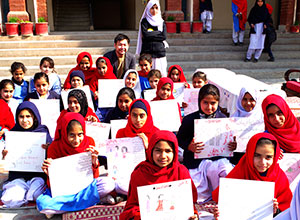Since 2011, the Association for Aid and Relief,
Japan (AAR) has built toilets and hand-washing facilities in elementary schools
in the north-western Khyber Pakhtunkhwa province of Pakistan. In February 2018,
the schoolchildren had their very first experience of decorating these
facilities with tiles on which they had drawn pictures. Shajeha Khan from our Haripur Office in Pakistan reports on the project.
What colors shall I use?
“Come and look!
I drew a wonderful picture using lots of colors!” On February 8, 2018, the children of Hattar Elementary School located in the Haripur
District of Khyber Pakhtunkhwa province gathered excitedly in the schoolyard. Using
12 different colored crayons, 25 students ranging from third to fifth grade drew
pictures on the tiles used for decorating the walls of their toilets and hand-washing
facilities. Each student was given a tile (approximately 30 centimeters squared
in size) by the AAR staff. Then, in groups of 4 or 5, the students began drawing
pictures on their tiles featuring themes such as health, hygiene or
cleanliness.
 |
| Children excited about drawing pictures on tiles (taken in February 2018) |
AAR had undertaken construction and repair of sanitary
facilities in many elementary schools, but this was the very first time that the
teachers and schoolchildren were involved. After discussing how that could be achieved,
AAR decided to let them decorate these facilities themselves. By introducing this project, AAR hoped that
the teachers and schoolchildren would feel attached to the facilities that they
helped design and eventually come to take diligent care of them. Not only that,
drawing is a lot of fun for the children!
 |
|
Zainab Grad washing her hands in front of the hand-washing facilities decorated by the
schoolchildren. She says, “Now I wash my
hands more thoroughly than I used to before lunch.”
|
“Which color shall I use?”
“I’m going to draw trees, because I love green.”
“I’m going to draw how to get clean water.”
“Brushing my teeth makes me feel good, so I’ll draw a picture of myself
brushing my teeth.”
“Which color shall
I use to draw a picture of dirty hands, yellow or brown?” |
| This picture
conveys a message, “Let’s plant trees to make our surroundings look beautiful!” |
 |
| A cloudless sky with a rainbow and a neat house symbolizes the belief that “Cleanliness means the same as reverence for God.” |
 |
| This picture conveys a message that brushing teeth in a proper way is very important. |
 |
| The flower arrangement placed on the textbook
symbolizes the hope that, by keeping the school and the surroundings clean,
everything will go well, and we can hope for a bright future.” |
Cleanliness is Faith
All the pictures turned out to be excellent because the children had practiced drawing in preparation for this project. My personal
favorite is the drawing which shows the 8 steps involved in washing hands:
rinse your hands with water, put the soap onto your hands, wash the back and
the palm of your hands, wash your fingers, fingernails and wrists, and finally
rinse the soap off.By drawing fluffy
foam, the child wanted to emphasize the fact that washing hands will keep you
from getting sick. Others drew pictures with messages such as “Cut your
fingernails”, “Comb your hair” and “Put the rubbish into the litterbox.” One
picture said,
“Cleanliness is half-truth,” which is one of
the pillars of the Islamic faith that “you must keep your body clean, the
surroundings neat and organize your thoughts”.
 |
| In order to prevent a cold or disease, you must follow the instructions for washing your hands. |
The
schoolchildren were put in groups of four and spent an hour and a half drawing
these pictures.
The Fruits of
the Project
 |
| At a photo session. the teachers and the schoolchildren said words of thanks to AAR and supporters: “Thanks to this project, we can now use the toilets in our school and have access to clean water.” |
Art classes are rarely found in public
schools in Pakistan, so this was the first time for many children to draw a
picture in school. Zainab Grad (a third grade student) said, smiling, “I really
enjoyed expressing my ideas by drawing. I want to plant trees so that my school
and the area surrounding my house looks beautiful. This is what I drew.” Ms. Shaheen, the principal of the school,
also said with joy, “I was pleasantly surprised to see my students being
actively involved in this project. It has turned out to be a wonderful
opportunity to realize the value of good health and the importance of
cleanliness.”
Watching the children drawing their pictures with
passion, I could see that the sanitary facilities in this school would be treasured
and used with the utmost care. I also drew a picture on one of the tiles with
the following message: Hygiene and health are the biggest blessing from God. It
means that, if we keep ourselves clean and healthy, we can think and act in a
positive way.
 |
Noor Zaman says, “ Since I learned how important it is to
keep myself clean, I make it a rule to wash my hands after playing with my
friends.”
|
Reporter
The profile as of the date of the article
The profile as of the date of the article
 |
| Shajeha Khanan working for the Haripur Office in Pakistan (Right) |

